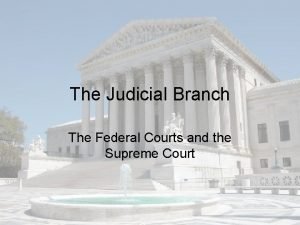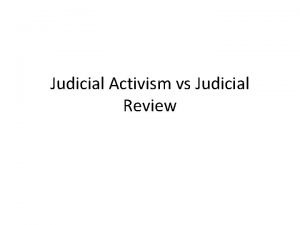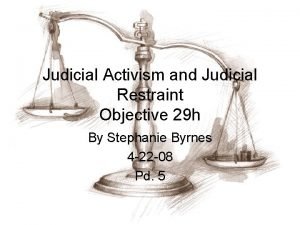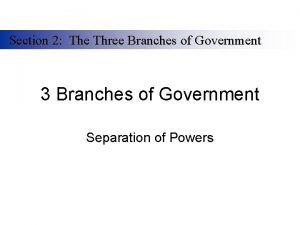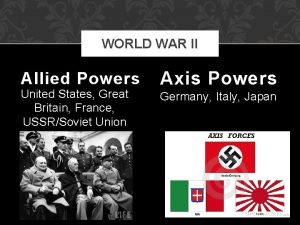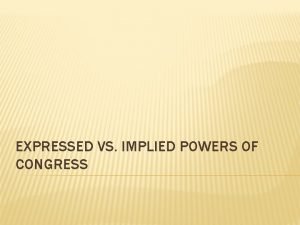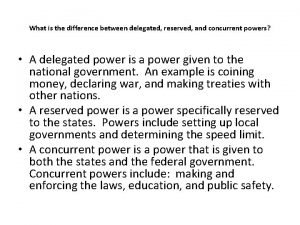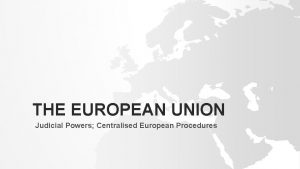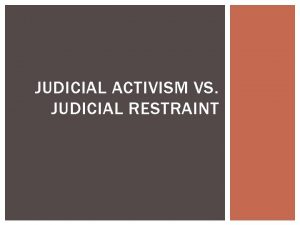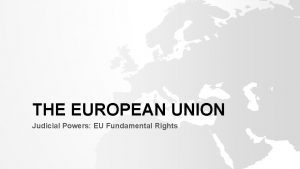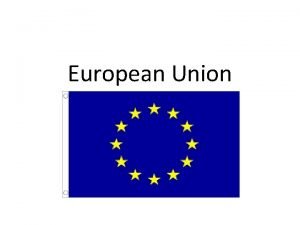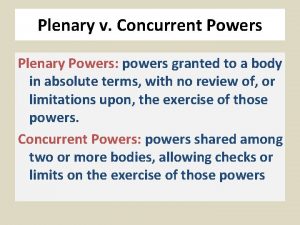THE EUROPEAN UNION Judicial Powers Decentralised National Procedures








![THE LIABILITY PRINCIPLE A European remedy exists for breaches of EU law. (Francovich [1991]) THE LIABILITY PRINCIPLE A European remedy exists for breaches of EU law. (Francovich [1991])](https://slidetodoc.com/presentation_image/2e3a6dd3d94b7c3c2ce622de037ba933/image-9.jpg)



- Slides: 12

THE EUROPEAN UNION Judicial Powers: Decentralised National Procedures

In This Section… • The role of national courts • The three principles: The principle of consistent interpretation • The principle of equivalence • The principle of effectiveness • • Procedural limits to invocability • Liabilities State liability • Private liability • SCHUTZE. EU

THE ROLE OF THE NATIONAL COURTS § National courts are the principal judicial enforcers of EU law and considered the guardians of EU law. § If EU law is directly effective, national courts must apply it. § Simmenthal [1978] held that each national court must be able to disapply national law that doesn’t comply with the European Legal Order. § All national courts are European Courts. § National Courts are functionally (not institutionally) European Courts. § National Procedural Autonomy; In the judicial enforcement of EU law, the Union “piggybacks” on the national judicial systems. § Article 4(3) TEU: duty of sincere co-operation in accordance with Article 19(1) TEU in relation to provision of sufficient remedies. § Procedural autonomy of Member States is relative. SCHUTZE. EU

And how do national courts perform this role? What principles guide or ‘govern’ their functional role as European courts? THE THREE PRINCIPLES: consistent interpretation, equivalence, & effectiveness SCHUTZE. EU

1. THE PRINCIPLE OF CONSISTENT INTERPRETATION § The European Court has created the general duty upon national courts to interpret national law as far as possible in light of European Law. (Von Colson [1984]) § This duty applies regardless of when the national provisions in question were adopted. (Marleasing [1990]) § National court are required to adjust the interpretation “in so far as it is given discretion to do so under national law. ” (Van Colson [1984]) § National limits to interpretative methods are allowed. (Pfeiffer [2004]) Courts to do lies its jurisdiction § Duty is are limited bywhatever the limited bywithin “the general principles of law which form part of law to interpret national in light of with European and in particular the law principles legal certainty. Law. and non-retroactivity. ”(Kolpinghuis [1987]) § But, SCHUTZE. EU remember, national courts are only required to interpret… not amend!

2. THE PRINCIPLE OF EQUIVALENCE § National procedures and remedies for the enforcement of European Rights cannot be less favourable than those of similar domestic actions. (Rewe [1989]) § Formal extension to similar actionsnot all actions. § Non-discrimination logic behind the principle; See i-21 Germany & Arcor vs. Germany [2006] § High national threshold for judicial challenges are allowed so long as they are applied without discrimination to European actions in national courts. § How similar does the equivalent action need to be? SCHUTZE. EU Edis [1998] • Equivalent action was based to be on the national remedies available for refunds from public bodies. • The existence of a more favourable limitation period for private parties was irrelevant since the equivalent principle only requires treating like actions alike. Levez [1998] • National law cannot provide an appropriate ground of comparison against which to measure compliance with the principle of equivalence. • Remedies for equal pay rights needed to be compared with national remedies for claims similar to those based on the Act. Wolverhampton Healthcare Trust [2000] • National courts are required to ask, “whether the actions concerned are similar as regards their purpose, cause of action and essential characteristics. ”

3. THE PRINCIPLE OF EFFECTIVENESS § This principle appears to ask national legal systems to provide for a substantive minimum content that would guarantee the enforcement of European rights in national courts. § Does this mean that there is a positive discriminatory situation in favour of European law? § National remedies would only be found inefficient where “they made it impossible in practice to exercise the rights which the national courts are obliged to protect. ” (Rewe [1989]) there are 3 different standards! § And so, this remains a confusing area! From Judicial Restraint to Judicial Balance Judicial Restraint • Judicial minimalism • Rewe [1989] • Position was premised on the hope of future legislative harmonisation by the Union. SCHUTZE. EU Judicial Intervention • More demanding standard of effectiveness. • Von Colson [1984] • Instead of a minimum standard the Court moved towards an aspirational standard towards full effectiveness of EU law. • Dekker [1990] • Factortame [1990] came close to demanding the maximum standard of effectiveness. Judicial Balance • Court tried to find balance between the minimum standard and maximum standard. • Steenhorst-Neerings [1993] developed a distinction between rules that preclude and rules that restrict. • Preston [2000] making European rights excessively difficult would breach the effectiveness principle. • Medium standard of effectiveness. • Unibet [2007] created new remedies for the enforcement of European

PROCEDURAL LIMITS TO INVOCABILITY § Procedural problem with this concept in regards of application to the invocation of European Law. § Peterbroeck [1995] examined this issue; developed a contextual test to discover whether the application of a national procedure rendered the application of European Law excessively difficult. § Van Schijndel [1995] established that national courts were not required to invoke European law ex officio. § The Court will only challenge national procedural rules that meet the excessively difficult criteria. § Van der Weerd [2007] identified two key factors in determining whether it considers the effectiveness principle to demand the ex officio application of European law: 1. National courts generally not to be asked to forsake their passive role in private law actions. 2. The more important the European Law is the more likely an ex officio application of EU law is needed. SCHUTZE. EU
![THE LIABILITY PRINCIPLE A European remedy exists for breaches of EU law Francovich 1991 THE LIABILITY PRINCIPLE A European remedy exists for breaches of EU law. (Francovich [1991])](https://slidetodoc.com/presentation_image/2e3a6dd3d94b7c3c2ce622de037ba933/image-9.jpg)
THE LIABILITY PRINCIPLE A European remedy exists for breaches of EU law. (Francovich [1991]) STATE LIABILITY § Francovich [1991] found that the right to reparation for the violations that had occurred was “a right founded directly on European law. ” This can be said to stem from Article 4(3) TEU. § Brasserie du Pecheur [1996] Confirmed that the principle of state liability was rooted in the constitutional traditions common to Member States. § State liability is dependent on three criteria: A European Act must have been intended to grant individuals rights, and these rights despite having no direct effect are identifiable. § Brasserie du Pecheur [1996] restricted state liability to sufficiently serious breaches. § Hedley Lomas [1996] The less discretion, the less limited liability the state will have. § For executive breaches, the threshold for establishing a breach is much lower. § The national judiciary can theoretically be liable for a violation of EU law that triggers state liability. (Kobler [2003]) Liability for damages does not undermine the independence of the judiciary as it does not concern personal liability of the judges. SCHUTZE. EU

PRIVATE LIABILITY § Horizontal application of liability. § Union legal order has always envisaged that European law could directly impose obligations on individuals. § Courage vs. Crehan [2001] damages for loss suffered was required for breach of European competition law by the private party. § Manfredi [2006] confirmed the establishment of private liability in Courage. § However the private liability doctrine is confined to breaches of obligations directly addressed to individuals. SCHUTZE. EU

CONCLUSION § National courts are functionally Union courts. § National procedural autonomy is qualified by four principles. 1. National courts are under an obligation to interpret national law as far as possible in light with European law. 2. National remedies should be provided in order to prevent or discourage breaches of European law. 3. Equivalence & Effectiveness principles 4. Liability principle (for States & private parties) SCHUTZE. EU

 Judicial activism vs judicial restraint
Judicial activism vs judicial restraint Judicial restraint vs judicial activism
Judicial restraint vs judicial activism Judicial activism vs restraint
Judicial activism vs restraint Constitution
Constitution Judicial restraint vs judicial activism
Judicial restraint vs judicial activism Judicial branch powers
Judicial branch powers Was the united states on the axis powers or allied powers?
Was the united states on the axis powers or allied powers? Central powers wwi
Central powers wwi Expressed and implied powers
Expressed and implied powers Enumerated vs implied
Enumerated vs implied What are the implied powers
What are the implied powers How do delegated, reserved, and concurrent powers differ?
How do delegated, reserved, and concurrent powers differ? Presidential powers informal or implied powers
Presidential powers informal or implied powers
